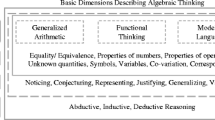Abstract
Vygotsky asserted that the student who had mastered algebra had attained «a new higher plane of thought», a level of abstraction and generalization which transformed the meaning of the lower (arthmetic) level. He also affirmed the importance of the mastery of scientific concepts for the development of the ability to think theoretically, and emphasized the mediating role of semiotic forms and symbol systems in developing this ability. Although historically in mathematics and traditionally in education, algebra followed arithmetic, Vygotskian theory supports the reversal of this sequence in the service of orienting children to the most abstract and general level of understanding initially. This organization of learning activity for the development of algebraic thinking is very different from the introduction of elements of algebra into the study of arithmetic in the early grades. The intended theoretical (algebraic) understanding is attained through appropriation of psychological tools, in the form of specially designed schematics, whose mastery is not merely incidental to but the explicit focus of instruction. The author's research in implementing Davydov's Vygotskian-based elementary mathematics curriculum in the U.S. suggests that these characteristics function synergistically to develop algebraic understanding and computational competence as well.
Kurzreferat
Vygotsky ging davon aus, dass Lernende, denen es gelingt, Algebra zu beherrschen, «ein höheres gedankliches Niveau» erreicht hätten, eine Ebene von Abstraktion und Generalisierung, welche die Bedeutung der niederen (arithmetischen) Ebene verändert Er bestätigte auch die Relevanz der Beherrschung von wissenschaftlichen Begriffen für die Entwicklung der Fähigkeit, theoretisch zu denken und betonte dabei die vermittelnde Rolle von semiotischen Formen und Symbolsystemen für die Ausformung dieser Fähigkeit. Obwohl mathematik-historisch und traditionell erziehungswissenschaftlich betrachtet, Algebra der Arithmetik folgte, stützt Vygotski's Theorie die Umkehrung dieser Sequenz bei dem Bemühen, Kinder an das abstrakteste und allgemeinste Niveau des ersten Verstehens heranzuführen. Diese Organisation von Lernaktivitäten für die Ausbildung algebraischen Denkens unterscheidet sich erheblich von der Einführung von Algebra-Elementen in das Lernen von Arithmetik während der ersten Schuljahre. Das beabsichtigte theoretische (algebraische) Verstehen wird erreicht durch die Aneignung psychologischer Mittel, und zwar in Form von dafür speziell entwickelten Schemata, deren Beherrschung nicht nur beiläufig erfolgt, sondern Schwerpunkt des Unterrichts ist. Die im Beitrag beschriebenen Forschungen zur Implementierung von Davydov's elementarmathematischen Curriculum in den Vereinigten Staaten, das auf Vygotsky basiert, legt die Vermutung nahe, dass diese Charakteristika bei der Entwicklung von algebraischem Verstehen und von Rechenkompetenzen synergetisch funktionieren.
Similar content being viewed by others
References
Bourbaki, N. (1962): Algebra, trans. from the French.—Moscow: Fitmatgiz
Bourbaki, N. (1963): Essays on the history of mathematics, trans. from the French.—Moscow: IL
Davydov, V.V. (1975). Logical and psychological problems of elementary mathematics as an academic subject.—In: L.P. Steffe (Ed.), Soviet studies in the psychology of learning and teaching mathematics (Vol. VII). Chicago, IL: University of Chicago Press, p. 55–107.
Davydov, V.V. (1990): Types of generalization in instruction: Logical and psychological problems in the structuring of school curricula.—Reston, VA: National Council of Teachers of Mathematics. (Original published in 1972)
Davydov, V.V., Gorbov, S.F., Mikulina, G.G., & Saveleva, O.V. (1999): Mathematics: Class 1.—J. Schmittau (Ed.), Binghamton, NY: State University of New York.
Davydov, V.V., Gorbov, S.F., Mikulina, G.G., & Saveleva, O.V. (2000): Mathematics: Class 2.—J. Schmittau (Ed.), Binghamton, NY: State University of New York.
Davydov, V.V., Gorbov, S.F., Mikulina, G.G., Savyelyeva, O.V., & Tabachnikova, N.L. (2001): Mathematics: 3rd Grade.—J. Schmittau (Ed.), Binghamton, NY: State University of New York
Elkonin, D.B. (1975): Primary schoolchildren's intellectual capabilities and the content of instruction.—In: L.P. Steffe (Ed.), Soviet studies in the psychology of learning and teaching mathematics (Vol. VII). Chicago, IL: University of Chicago Press, p. 13–54.
Kline, M. (1959): Mathematics and the physical world.—New York: Dover Publications
Lee, J. (2002): An analysis of difficulties encountered in teaching Davydov's mathematics curriculum to students in a U.S. setting and measures found to be effective in addressing them.—Binghamton, NY, State University of New York at Binghanton, Doctoral Diss.
Nicolopoulou, A. (1997): The invention of writing and the development of numerical concepts in Sumeria: Some implications for developmental psychology.—In: M. Cole, Y. Engestrom, & O. Vasquez (Eds.), Mind, culture, and activity. Cambridge, UK: Cambridge University Press, p. 205–225
Schmittau, J. (1993): Vygotskian scientific concepts: Implications for mathematics education.—In: Focus on Learning Problems in Mathematics, 15 (Nos. 2–3), p. 29–39.
Schmittau, J. (2003a): Cultural historical theory and mathematics education.—In: A. Kozulin, B. Gindis, S. Miller, & V. Ageyev (Eds.), Vygotsky's educational theory in cultural context. Cambridge, UK: Cambridge University Press, p. 225–245.
Schmittau, J. (2003b): Beyond constructivism and back to basics: A cultural historical alternative to the teaching of the base ten positional system.—In B. Rainforth & J. Kugelmass (Eds.), Curriculum and instruction for all learners: Blending systematic and constructivist approaches in inclusive elementary schools. Baltimore, MD: Brookes Publishing Co., p. 113–132.
Schmittau, J. (2004): Vygotskian theory and mathematics education: Resolving the conceptual-procedural dichotomy.—In: European Journal of Psychology of Education, XIX(No.1), p. 19–43
Schmittau, J. & Morris, A. (2004): The development of algebra in the elementary mathematics curriculum of V.V. Davydov.—In The Mathematics Educator, 8(1), p. 60–87
Skemp, R. (1987). The psychology of learning mathematics.—Hillsdale, NJ: Erlbaum
Vygotsky, L.S. (1986): Thought and language.—Cambridge, MA: MIT Press. (Original published in 1934)
Zankov, L.V. (1963): Elementary instruction.—Moscow: Academy of Pedagogical Sciences of the RSFSR




